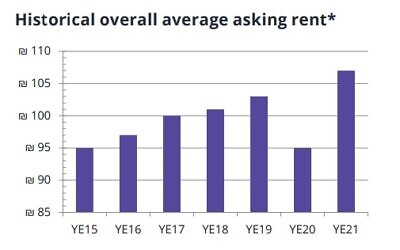Tel Aviv office market gone mad: High demand drives shortage, steep
[ad_1]
Tel Aviv’s office shortage and eye-popping prices have become so intense that a startup founder who had recently raised funds to grow the company wondered out loud whether he should acquire another startup strictly for its five-year office lease in a prime location in the city.
This tidbit appeared last month in a weekly real estate newsletter put together by Guy Amosi, CEO and managing partner of the Israel office of international real estate advisory firm Avison Young. The conversation took place during a meeting between the founder and members of the firm, Amosi relayed in the newsletter, distributed to over 4,000 global business leaders.
In a LinkedIn post later, Avison Young wrote that as much as such thinking sounds “removed from reality, it is also firmly attached to it.”
Over the past 18 months, “real estate in the right location has become… almost as important as [a] company’s patents,” the post read.
Demand for offices around Tel Aviv’s Savidor and Hashalom train stations has risen exponentially and supply is quickly decreasing, the firm said. The area, called the “scooter triangle,” runs along both the eastern and western sides of the Ayalon highway from the Arlozorov interchange to south of Yitzhak Sadeh Street, where the Azrieli Towers and Sarona anchor the space on Menachem Begin Boulevard.
The name denotes the preferred mode of transportation for many employees in a city that suffers from terrible traffic congestion.

An illustrative photo of a person riding an electric scooter in Tel Aviv, November 27, 2019. (Miriam Alster/FLASH90)
“Quality office space has become like a valuable patent in the sense that it is a gateway to making high quality hires. Office space located near the talent is key to a company’s success,” Amosi told The Times of Israel by phone last week.
During the first few months of the COVID-19 outbreak, real estate experts struggled to identify the impact that “work from home” rules would have on the office market. There were concerns of a severe glut of office space such as the case in 2003-2005, in the aftermath of the dot-com crash.
But despite employees’ preferences for working remotely, even partially, tech firms are aggressively expanding their physical footprint and focusing their attention on prime Tel Aviv office towers.

A study by real estate firm Avison Young shows rising rents for office space in Tel Aviv. (Avison Young)
Avison Young’s Tel Aviv Market overview for the second half (H2) of 2021 provides a clear view of the price and occupancy development in the Tel Aviv prime office market.
Its analysis indicates a temporary softening of the office market at the start of the COVID-19 pandemic in 2020 and a dramatic rebound in 2021.
Amosi noted that, today, rents would be even higher for Class A…
[ad_2]
Read More: Tel Aviv office market gone mad: High demand drives shortage, steep
